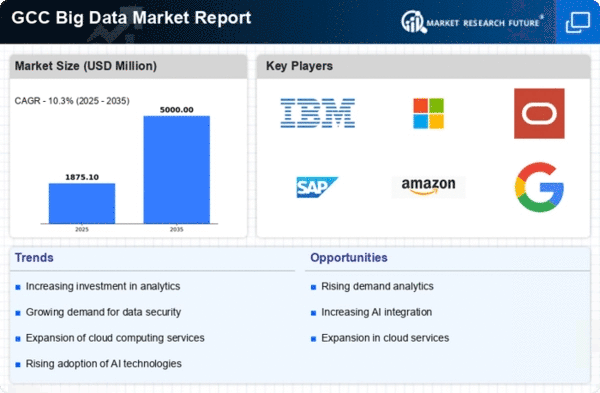Emergence of IoT Technologies
The proliferation of Internet of Things (IoT) devices in the GCC is significantly impacting the big data market. As more devices become interconnected, the volume of data generated is increasing exponentially. This surge in data necessitates advanced big data solutions for effective management and analysis. Industries such as healthcare, manufacturing, and transportation are particularly benefiting from IoT integration, as it allows for real-time data collection and analysis. The big data market is expected to grow by approximately 20% as organizations seek to harness IoT data for improved operational efficiency and enhanced customer experiences. This trend indicates a strong alignment between IoT advancements and the evolving needs of the big data market.
Advancements in Cloud Computing
The rapid advancements in cloud computing technologies are significantly influencing the big data market in the GCC. Cloud solutions offer scalable and cost-effective options for data storage and processing, making them attractive to businesses of all sizes. The adoption of cloud-based big data platforms is expected to increase by approximately 40% as organizations seek to leverage the flexibility and efficiency of cloud services. This shift allows companies to manage large volumes of data without the need for extensive on-premises infrastructure. Consequently, the big data market is poised for substantial growth as cloud computing continues to evolve and integrate with big data solutions.
Rising Demand for Data Analytics
The big data market in the GCC is experiencing a notable surge in demand for data analytics solutions. Organizations across various sectors are increasingly recognizing the value of data-driven decision-making. This trend is evidenced by a projected growth rate of approximately 25% annually in the analytics segment. Companies are investing in advanced analytics tools to enhance operational efficiency and customer engagement. The financial services sector, in particular, is leveraging big data analytics to optimize risk management and improve customer insights. As businesses strive to remain competitive, the integration of analytics into their operations is becoming essential, thereby driving the growth of the big data market.
Government Initiatives and Support
Government initiatives in the GCC are playing a pivotal role in fostering the growth of the big data market. Various national strategies emphasize the importance of data as a key asset for economic development. For instance, initiatives aimed at enhancing digital infrastructure and promoting smart city projects are expected to boost the demand for big data solutions. The UAE's Vision 2021 and Saudi Arabia's Vision 2030 highlight the commitment to harnessing data for innovation and efficiency. Such governmental support not only encourages private sector investment but also creates a conducive environment for the big data market to flourish, potentially leading to a market expansion of over 30% in the coming years.
Growing Focus on Data Monetization
Organizations in the GCC are increasingly recognizing the potential of data monetization, which is driving the big data market forward. Companies are exploring innovative ways to leverage their data assets to generate additional revenue streams. This trend is particularly evident in sectors such as retail and telecommunications, where customer data can be transformed into valuable insights. The market for data monetization solutions is projected to grow by around 15% annually as businesses seek to capitalize on their data. This shift towards monetization not only enhances profitability but also underscores the strategic importance of data within the big data market.
















